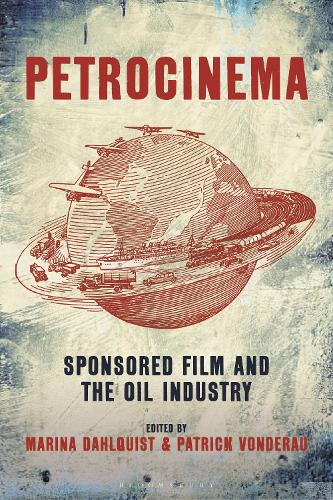
Petrocinema: Sponsored Film and the Oil Industry
(Paperback)
Available Formats
Publishing Details
Petrocinema: Sponsored Film and the Oil Industry
By (Author) Marina Dahlquist
Edited by Patrick Vonderau
Bloomsbury Publishing PLC
Bloomsbury Academic USA
25th August 2022
United States
Classifications
Tertiary Education
Non Fiction
Film, TV and Radio industries
Petroleum, oil and gas industries
791.43
Physical Properties
Paperback
272
Width 152mm, Height 229mm
Description
Petrocinema presents a collection of essays concerning the close relationship between the oil industry and modern mediaespecially film. Since the early 1920s, oil extracting companies such as Standard Oil, Royal Dutch/Shell, ConocoPhillips, or Statoil have been producing and circulating moving images for various purposes including research and training, safety, process observation, or promotion. Such industrial and sponsored films include documentaries, educationals, and commercials that formed part of a larger cultural project to transform the image of oil exploitation, creating media interfaces that would allow corporations to coordinate their goals with broader cultural and societal concerns. Falling outside of the domain of conventional cinema, such films firmly belong to an emerging canon of sponsored and educational film and media that has developed over the past decade. Contributing to this burgeoning field of sponsored and educational film scholarship, chapters in this book bear on the intersecting cultural histories of oil extraction and media history by looking closely at moving image imaginaries of the oil industry, from the earliest origins or spills in the 20th century to todays post industrial petromelancholia.
Reviews
Petrocinema is a necessary collection that explores the long history of media produced by oil industries around the world. It is edited by significant, established scholars with considerable experience, and it brings together noteworthy scholars from around the world. The brilliant essays encompass detailed histories of oil-fuelled media (in the US, Nigeria, and India) alongside conceptual exploration of the role of media in fostering carbon-based economies accelerating in the post-WWII years. The book is a significant resource for scholars interested in a host of things including the history of oil extraction, corporate propaganda, non-theatrical and documentary cinema and its exploration of the media produced by some of the most significant corporate entities of the last three centuries is a significant and necessary task. * Lee Grieveson, Professor of Media History, University College London, UK *
This timely volume offers a groundbreaking exploration of the relationship between oil, the oil industry, and cinema, showing how, across a range of places and times, petroleum and the business of its extraction have structured the moving imageand, in turn, culture, politics, and everyday life. Petrocinema is an invaluable contribution to sponsored and nonfiction media studies, industrial history, and the energy humanities alike. * Alice Lovejoy, author of Army Film and the Avant Garde: Cinema and Experiment in the Czechoslovak Military (2015) *
Author Bio
Marina Dahlquist is a Professor of Cinema Studies at the Department for Media Studies at Stockholm University, Sweden. She recently published The Institutionalization of Educational Cinema: North America and Europe in the 1910s and 1920s (2020, with Joel Frykholm), Corporeality in Early Cinema: Viscera, Skin, and Physical Form (2018, with Doron Galili, Jan Olsson, and Valentine Robert), and Exporting Perilous Pauline: Pearl White and the Serial Film Craze (2013). Patrick Vonderau is a Professor of Media and Communication Studies at the University of Halle, Germany. Recent book publications include, among others, Advertising and the Transformation of Screen Cultures (2020, with B. Florin and Y. Zimmermann), Films that Sell: Moving Pictures and Advertising (2016, with N. de Klerk and B. Florin), and Films that Work: Industrial Film and the Productivity of Media (2011, with V. Hediger). He is also an editor of the German scholarly journal Montage AV.
